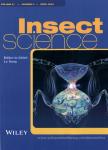Putative nicotinic acetylcholine receptor subunits express differentially through the life cycle of codling moth, Cydia pomonella (Lepidoptera: Tortricidae)
Putative nicotinic acetylcholine receptor subunits express differentially through the life cycle of codling moth, Cydia pomonella (Lepidoptera: Tortricidae)作者机构:USDA-ARS Yakima Agricultural Research Laboratory Wapato WA 98951 USA
出 版 物:《Insect Science》 (昆虫科学(英文版))
年 卷 期:2016年第23卷第2期
页 面:277-287页
核心收录:
学科分类:0710[理学-生物学] 081704[工学-应用化学] 07[理学] 08[工学] 0817[工学-化学工程与技术] 09[农学] 070303[理学-有机化学] 0703[理学-化学]
基 金:We thank Drs. Man-Yeon Choi and Rodney Cooper for critical review of this manuscript. We are most grate- ful to Laura Willett Kim Shannon and Karolynn Tom for maintenance of the codling moth colony. Dr. MichaelParra (Heritage University) is thanked for his helpful dis- cussions and comments. This work was supported by a grant from the Washington Tree Fruit Research Commis- sion (awarded to SFG CP-13-101) and a grant from the Research Experience for Undergraduates program of the National Science Foundation (awarded to Nina Barcenas Heritage University NSF-REU Award# 1156603)
主 题:codling moth nAChR expression nicotinic acetylcholine receptor subunits
摘 要:Nicotinic acetylcholine receptors (nAChRs) are the targets of neonicotinoids and spinosads, two insecticides used in orchards to effectively control codling moth, Cydia pomonella (L.) (Lepidoptera: Tortricidae). Orchardists in Washington State are concerned about the possibility of codling moth field populations developing resistance to these two insecticides. In an effort to help mitigate this issue, we initiated a project to identify and characterize codling moth nAChR subunits expressed in heads. This study had two main goals; (i) identify transcripts from a codling moth head transcriptome that encode for nAChR subunits, and (ii) determine nAChR subunit expression profiles in various life stages of codling moth. From a codling moth head transcriptome, 24 transcripts encoding for 12 putative nAChR subunit classes were identified and verified by PCR amplification, cloning, and sequence determination. Characterization of the deduced protein sequences encoded by putative nAChR transcripts revealed that they share the distinguishing features of the cys-loop ligand-gated ion channel superfamily with 9 α-type subunits and 3 β- type subunits identified. Phylogenetic analysis comparing these protein sequences to those of other insect nAChR subunits supports the identification of these proteins as nAChR subunits. Stage expression studies determined that there is clear differential expression of many of these subunits throughout the codling moth life cycle. The information from this study will be used in the future to monitor for potential target-site resistance mechanisms to neonicotinoids and spinosads in tolerant codling moth populations.



